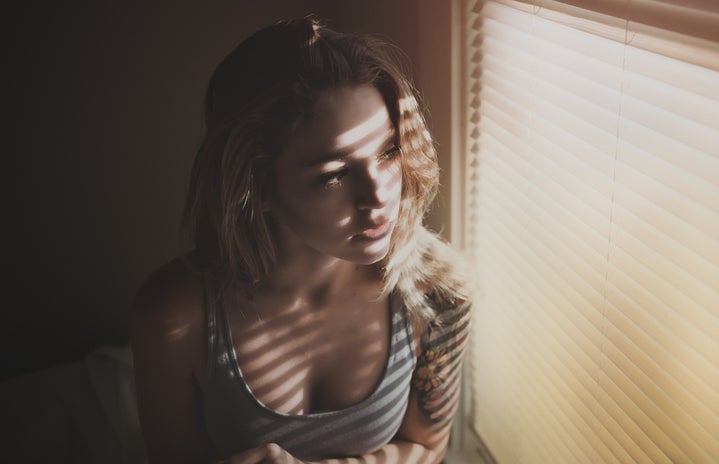“A sad soul can kill you quicker, far quicker, than a germ” – John Steinbeck.
Okay, great. What happens when you’re battling both of them?
As I sit here, looking at a pitch-black sky at 4 in the afternoon, I wonder how time passes so quickly? It feels like two days ago the sunset at 8 pm and stepping outside got you drenched in sweat.
I cannot be the only person who has seen countless memes on Twitter and Instagram complaining about how sudden daylight saving time came on and how much damage it is doing to the collective psyche of the younger generations. If this time of year you get moodier, more lethargic, and full of existential angst (ie: the feeling that time is racing by and you have little to no control as you hurdle to your ultimate death), you might be SAD.
—That’s a psychology joke.
SAD stands for Seasonal Affective Disorder, and it is incredibly common, especially in places with a drastic change in the hours of daylight. There are lots of causes for it, usually working together to fill you with dread, nostalgia, and moroseness. Unfortunately, that means that there is no fix-all for this, but I can—with information from my psychology minor, some tricks I’ve learned over my years as a New Englander, and with a little help from the Mayo Clinic— give you a little bit of a road map to work off of.
- Daylight
-
Seasonal depression is real and chemical. Our body’s circadian rhythm, or sleep pattern, is getting confused by the way that the world is changing. This is because our body doesn’t understand time the way our mind does, and our mind barely gets it either. We figure out if it’s sleep-time or wake-time by the amount of light around us, and when that light goes away, our body gets upset that we’re not sleeping more. If you feel this is the case for you, here’s what the Mayo Clinic (and myself) suggest:
Play around with the lights in your house! Warmer lights like yellow and pink will trick your body into thinking it is earlier in the day than harsher, colder lights. Turning on those warmer lights proactively (around 4:00 pm is what works best for me) will keep your mind and body from releasing melatonin and other sleep hormones. Naturally dimming those lights as it gets later will start to tell your body it’s time for sleep and will help you to fall asleep more easily when you’re ready to.
- Cold
-
Another common cause that can trigger SAD is the temperature. Our bodies and minds naturally associate feeling cold with loneliness. This is why, when we are sad, we often make ourselves warm beverages; the increase in the heat makes us feel comforted and works as a small, synthetic hug from the inside.
So how do you fix this? Warm clothing, warm blankets, and warm beverages are a start. While this seems obvious, especially for women or femme-presenting people, there is pressure not to feel cold in a room where others do not; so don’t be afraid to speak up and bundle up when your lips are blue. It is actually way more beneficial than you think
- The Passage of Time
-
I cannot be the only person who feels nostalgic for the time passed, or even feel that I’m getting older every year. I remember less from my childhood than I did some two or three years ago; I’m becoming more independent, my parents are getting older and these things really hit this time of year. My psychology professor here at Northeastern describes this as existential angst. In the winter, when we are more stagnant and lonely than other times of year and reminded of olden days and the passage of time at family gatherings, we have more time to think about our impending doom, as well as less distraction.
Frankl, an existential psychologist from the early 20th century, described existential angst as the feeling of pointlessness, and believed it led to depersonalization, deformation, and finally, disillusionment. These are the cornerstones of personality and, without them, you lose your “defined self.”
Frankl really did not need to call me out so hard.
But luckily, those are not so difficult to fix. Finding personal motivation distracts from the feeling that death is around the corner and unavoidable. Setting achievable but abstract goals for yourself and reiterating them consistently will help to establish this internal ambition. Frankl and my professor both agree: fulfillment kills angst.
My motivation, and the thing that makes me feel both self-actualized and optimistic, is that my younger self would be proud to see who I am today. So every day, when I feel awkward, stupid, ugly, or whatever, I tell myself that no matter what, I am better than where I was ten years ago, and that can get me through any funk.
There are so many things that can make us feel gloomy around this time of year. External factors, like the stress of finals, finding a co-op in this crazy economy, or getting ready to say goodbye to college friends, can accumulate to feeling those winter blues. But that doesn’t mean that you just have to grin and bear it. Try some of these things or do your own research and find other ways to cheer yourself up.
At the end of the day, these are things that work for me, but that doesn’t mean it’s going to work for everyone. SAD is a battle and things like grabbing a blanket when you’re cold are not just going to make the problem go away. Knowing yourself is the most effective way to help yourself battle and heal. But don’t discount feeling down as ‘something that will pass on its own’. Just because something is temporary doesn’t mean you have to suffer through it. So give yourself motivation, pour some hot chocolate, and turn on those lights, because…
Winter is Coming.



